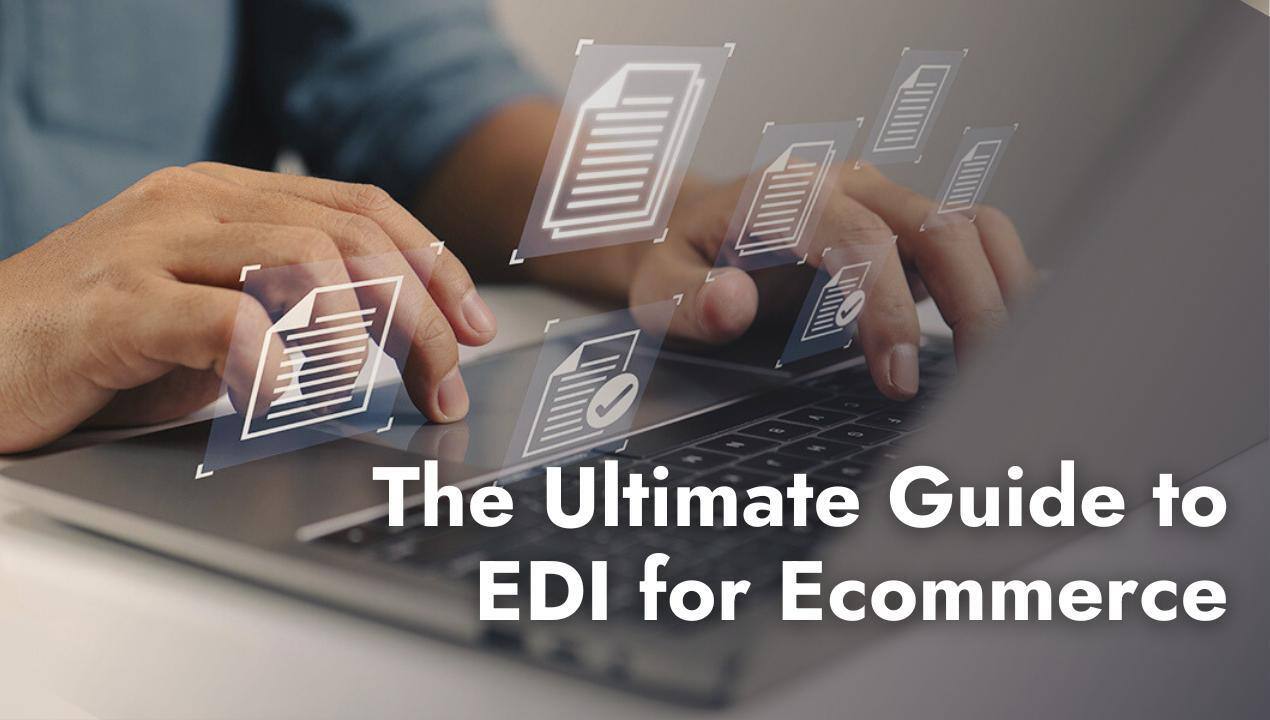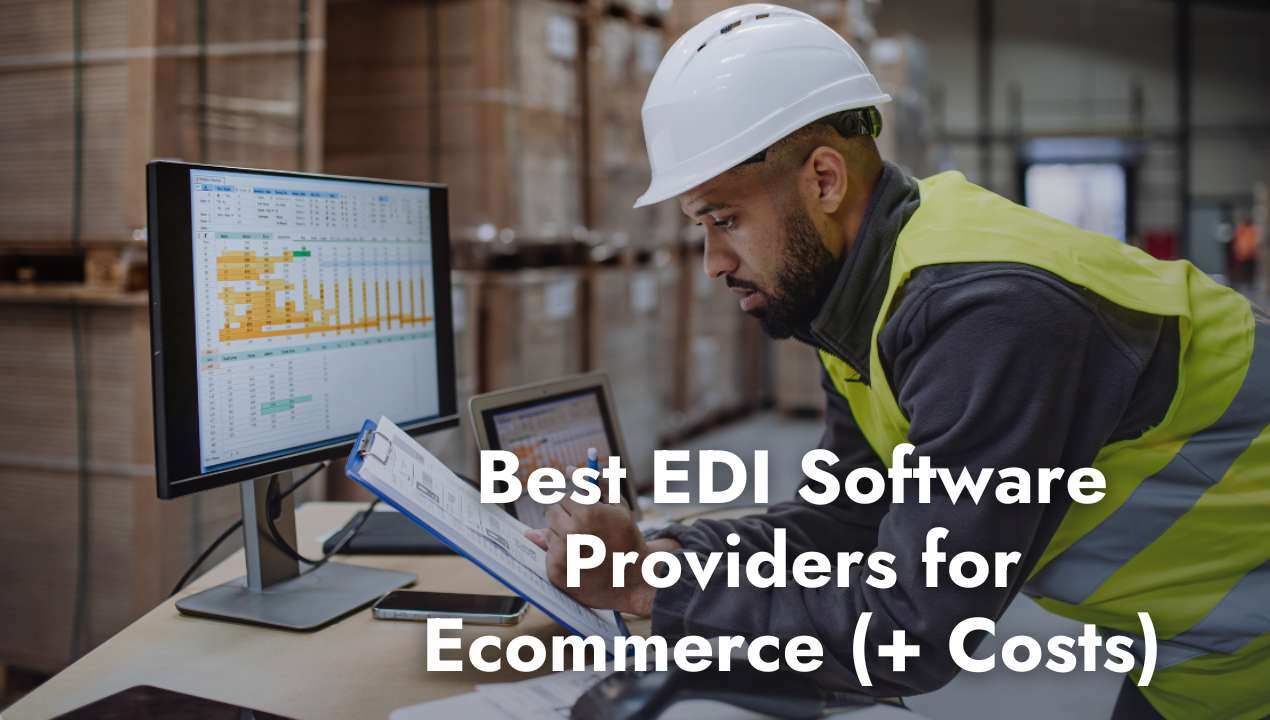Share this
The Ultimate Guide to EDI for Ecommerce
by Rin Mosher on May. 27, 2024

Between managing inventory, processing orders, handling customer service, and maintaining compliance with vendor expectations, there's a lot to juggle when expanding an ecommerce business into B2B and wholesale. Luckily, powerful tools like Electronic Data Interchange (EDI) exist to make the communications aspect of it much easier.
EDI for ecommerce allows you to electronically exchange key business documents like purchase orders and invoices automatically with retailers, suppliers, and other partners. In this comprehensive guide, we explain what EDI is, the types of documents that are commonly exchanged, and how it can optimize your ecommerce business operations across channels.
What is Electronic Data Interchange (EDI)?
Electronic Data Interchange (EDI) refers to the digital exchange of business documents between trading partners. EDI software allows users on each end to upload, process, and transmit files in a standardized, electronic format. It replaces the traditional use of paper and fax for documents such as purchase orders, invoices, and advance ship notices.
Where EDI Can Help Your Ecommerce Business
If your ecommerce business is eyeing expansion into B2B, wholesale, or retail channels, integrating an Electronic Data Interchange (EDI) system is practically a must-have. Venturing into these markets means managing more complex relationships, transactions, and increased order volume. EDI streamlines this process, automating the exchange of transactional documents to ensure everything runs smoothly and accurately.
Plus, it’s worth noting that most large retailers and wholesalers require EDI compliance from their partners. So, adopting EDI not only increases operational efficiency but also opens the door to new business relationships and opportunities in these channels.
Here are a few specific examples of where an EDI ecommerce solution can be of value:
B2B Transactions
B2B relationships are highly standardized by nature. Large retailers, like Walmart and Target, have receiving requirements and routing guides in place to simplify processes between the various vendors they work with. All ecommerce vendors are expected to follow the guidelines, and failing to do so can result in chargebacks. EDI allows for the automation of B2B and wholesale fulfillment processes, ensuring that orders, invoices, and other documents are sent in a consistent format to comply with these receiving requirements. This streamlines communication between partners and reduces errors caused by manual data entry.
Wholesale Operations
Wholesale fulfillment involves processing high volumes of orders on a regular basis. Manual data entry is time-consuming and can be prone to human error, which can lead to delays and discrepancies. EDI solutions allow for the automation of wholesale transactions, from order placement to invoicing and payment. It speeds up the entire process while employing checks and balances for accuracy, such as three-way matching – an accounting control method that compares the purchase order, receiving report, and invoice to ensure all details align before making payments.
Retail Management
Many retailers use EDI to manage their inventory and supply chain. These systems provide real-time updates on product availability and pricing from suppliers, enabling faster and better-informed decisions about purchasing and restocking. EDI also helps ecommerce businesses and retail partners manage their relationships, track orders, and provide transparency into the entire supply chain. This can result in quicker turnaround times, reduced inventory costs, and improved customer satisfaction.
How Does EDI Work?

EDI is like email but for exchanging transaction details such as orders, shipping notifications, and invoices between businesses. Businesses that want to send and receive documents must first implement EDI software either in-house or through a hosted service provider. Many criteria need to be considered during the service provider selection process, but we’ll discuss that in more detail later. For the time being, just remember that standard EDI systems function as follows:
1. Order Placement
Orders come through various channels, such as direct online platforms designed for business customers, emailed bulk orders, and integrated procurement-sales systems.
2. Data Preparation
The business’ order management system or enterprise resource planning system generates the data necessary to process the order. This includes details like items ordered, quantities, and pricing.
3. EDI Conversion
EDI software or a service provider converts the raw data into a format readable by the systems of trading partners.
4. Validation and Enhancement
EDI documents undergo validation checks before and after transmission to ensure all data is correct.
5. Transmission
The EDI documents are transmitted over a secure electronic channel to the intended recipient, which could be a logistics provider, a supplier, or a business customer. This usually only takes a minute or so, if not seconds.
6. Acknowledgement
Once the receiving party has validated and viewed the document using their EDI software, an acknowledgement is sent back in return. The back-end systems of both sides are then updated to reflect a successful transmission.
An Example of EDI In Action
Let's say a retail partner, Company A, places an order for 1,000 units of a product from the ecommerce business Company X. They submit their order through a designated online business portal, which is linked to Company X's EDI system.
Company A creates a purchase order using its internal ordering system or software. This Purchase Order (PO) is then converted into an EDI document and sent via a secure digital channel.
Company X's EDI system receives and automatically interprets the EDI document. It checks for any errors or discrepancies and generates an acknowledgment document that confirms the order has been received.
Once the order is confirmed, Company X's EDI system updates its inventory status to reflect the reserved stock and alerts its warehouse to begin fulfilling the order. As the order is picked and packed, the inventory levels are adjusted accordingly, and an Advance Ship Notice (ASN) is sent to Company A to inform them of the shipment details.
Company X then generates an electronic invoice that is sent back to Company A's EDI system once the shipment is dispatched.
Company A's EDI system receives the invoice and automatically updates its own accounting and inventory systems to reflect the financial obligation and incoming goods. Both sides keep each other informed on the status of the order through EDI documents until the items are delivered and the transaction is complete.
Types of Documents EDI Handles
EDI is used for a variety of documents in ecommerce and fulfillment. Some of the most common document types include:
Purchase Orders (POs)
A purchase order (PO) is a commercial document that indicates the types, quantities, and agreed prices for products or services between a buyer and seller. POs specify the terms and conditions of the sale, including required quantities, delivery expected dates, and payment terms. Businesses use purchase orders to manage spending and ensure purchases are properly authorized. With EDI, POs are automatically generated and transmitted, allowing for real-time, trackable exchanges between parties.
Invoices
Invoices provide details on the products or services provided, including quantities and prices. These documents are time-stamped and serve as the primary record for services rendered and payment requests. Invoices are comprehensive, including details such as invoice numbers, parties' names, contact information, item descriptions, and total amounts due, which can span multiple pages based on the transaction size. Delayed or lost invoices can create significant cash flow and legal disputes on both sides of the buyer-seller relationship in ecommerce. With a fully integrated EDI system in place, those outcomes are much less likely to occur.
Inventory Updates
Inventory updates keep relevant parties like managers, purchasing agents, and warehouse personnel in the loop about stock levels. While the ideal frequency at which they should be sent is different for every business, consistency is key, especially with integrated logistics systems and complex multi-echelon inventory management strategies. EDI software does the job of automatically sending updates without any manual intervention.
Advance Ship Notices (ASNs)
Advance Ship Notices (ASNs), packing lists, and similar documents are an important part of the modern supply chain process. They outline case-specific details about the items being shipped, quantity, and expected delivery date. The timely transmission of ASNs enables receiving parties to readily fulfill their duties, such as making space for incoming goods or scheduling labor. ASNs also provide crucial information to help with ecommerce inventory management and tracking product movement throughout the supply chain. EDI solutions can automatically generate and send these documents at scale.
Order Confirmations
Order confirmations act as official acknowledgments of the details of a purchase order, helping to reduce disputes between buyers and sellers. These documents, along with shipment and delivery confirmations, should be issued as quickly as possible. EDI's near-instant processing times can help companies avoid shortages, overstocks, and other complications that arise when orders are not properly communicated.
Returns and Refund Requests
Returns and refund requests are issued when a product is defective, damaged, incorrect, or unsatisfactory. Sellers receive these official requests through their EDI software and respond to approved cases with a Return Merchandise Authorization (RMA) document. Integrated EDI and Order Management Systems (OMS) then track and update the progress of the return in real-time.
Benefits of EDI for Ecommerce Businesses
If you’re wondering whether an EDI ecommerce solution is worth the time and effort of implementation, the answer is a resounding yes – especially if your business is considering expanding into B2B, retail, and wholesale channels. This technology is now standard in the logistics industry, and most well-established retailers and trading partners require the sellers they work with to use it. But there’s a lot more to benefit from beyond that. Here are a few of the advantages you can expect with a robust EDI system in place:
Improved Efficiency and Accuracy
EDI automates the exchange of business documents, such as purchase orders, invoices, and shipping notices. This automation reduces the need for manual data entry, which not only speeds up transaction times but reduces the room for human error to occur. The fast processing of transactions facilitated by EDI can also lead to quicker order fulfillment and faster delivery times.
Scalability
As your business grows, the volume of transactions and the complexity of managing multiple partners and customer demands also increase. EDI systems can scale to handle increased volumes across multiple channels without a corresponding increase in errors or processing time, making them ideal for growing businesses.
Cost Savings
By automating data exchanges, EDI eliminates the costs associated with manual and paper-based processing. Reducing manual data entry also minimizes the likelihood of errors that result in chargebacks, which can be costly to rectify and can lead to delays and customer dissatisfaction.
Enhanced Communication
Real-time communication and data sharing keep everyone in the supply chain on the same page. That's why EDI has become so commonplace in ecommerce – it allows for quick and easy communication between retailers, suppliers, warehouses, and other trading partners. This efficiency helps build trust and reliability, as retailers depend on the accuracy and timeliness of the information exchanged, leading to better and more sustainable business relationships.
Better Inventory Management
EDI integrates with warehouse and order management software to help retailers and manufacturers automate their inventory tracking. It provides real-time updates on stock levels, allowing businesses to plan ahead and optimize their storage space. This not only saves time but also minimizes the risk of overstocking, understocking, and losing out on retail deals due to inadequate stock levels.
How to Implement EDI In Ecommerce
Implementing Electronic Data Interchange in an ecommerce business in-house is a difficult process that requires ample planning and resources. To make the most out of your time and money, be sure to keep the following considerations in mind.
1. Assess Your Needs
Conduct a thorough assessment of your current business processes and identify areas where EDI can provide the most value. Evaluate factors such as transaction volume, the complexity of your supply chain, and the capabilities of your existing systems. Also consider the types of documents you exchange with trading partners. Most EDI ecommerce solutions today are capable of handling a variety of documents, including purchase orders, invoices, advance ship notices, and inventory updates.
2. Choose an EDI Provider
Not all EDI providers are made equal. Some cater to specific types of businesses, while others offer different flexibility and levels of customer support. It’s important to think carefully about which of these elements matter most to your business.
The EDI solution you choose should be able to seamlessly integrate with your existing ecommerce platform, ERP, and warehouse management system. You’ll also want the EDI provider to be familiar with those tools. Providers that offer flexible customization options like custom mapping, business rule configuration, and workflow automation ultimately deliver the most value to their customers.
SPSCommerce is among the most widely used EDI service providers today. Its pre-built solutions integrate with over 100 ERP and WMS systems. TrueCommerce, OpenText, and Inforcom Systems offer comparable alternatives worth considering. It’s important to consider each provider's pricing model to ensure that it aligns with your budget, taking potential long-term transaction fees, maintenance costs, and upgrade expenses into account. A third-party logistics (3PL) partner can make recommendations based on the solutions they already have in place.
3. Establish EDI Standards
EDI functions using standardized formats and protocols – namely ANSI X12, EDIFACT, and XML. X12 is the most widely used EDI standard in North America, while EDIFACT is more common in Europe and other international markets. Within these broad standards, there are specific transaction sets for different types of documents, such as the 850 for purchase orders or the 810 for invoices. Your EDI provider can help you identify which transaction sets are most relevant for your business based on the types of documents you exchange with trading partners.
4. Test and Validate
Conduct thorough testing and validation before launching your EDI system by sending test documents between and simulating everyday transactions with trading partners. This will help reveal any potential configuration issues and confirm that each partner has the right access permissions enabled.
Once you've successfully completed testing and validation, you can move forward with a phased rollout of your EDI system. It’s usually best to start with a small subset of trading partners or transactions and gradually expand as you gain confidence in the system's stability and reliability.
5. Monitor and Maintain
Regularly review transaction volumes, error rates, and processing times to identify opportunities to optimize your EDI system. A proactive approach like this can make a big difference when it comes to minimizing disruptions and maintaining strong relationships with trading partners over the long term.
Also remember that as your business evolves and grows, its EDI system will need to adapt and scale accordingly. It’s worth regularly reassessing the solution you have in place to ensure it has the capacity to meet today’s and tomorrow’s operational needs.
Explore Shipfusion's EDI Solution
EDI is incredibly powerful, but it can also be complex and challenging to implement. Shipfusion’s technological solutions make benefitting from EDI easier than ever.
Customized EDI Integration
Shipfusion’s team of experts will work closely with you to understand your unique business requirements. We have EDI set up readily available for Shopify integration, WooCommerce integration, and all other popular ecommerce platforms.
Dedicated Support
Our dedicated Account Managers are available to assist you throughout the EDI implementation process and beyond. You’ll gain peace of mind knowing that issues will be caught and addressed before they impact your fulfillment operations.
Scalable Solutions
Shipfusion’s services are designed to scale with you, making it easy to add new trading partners, accommodate increased transaction volumes, and adapt to evolving industry standards.
Continuous Improvement
Shipfusion is committed to helping you achieve long-term success. Count on us to continuously monitor and evaluate your system’s performance, identify areas for improvement, and implement enhancements as needed.
Electronic Data Interchange can help your ecommerce business by streamlining communication, improving efficiency, and reducing errors. Understanding the types of documents that EDI can handle – and more importantly, how to implement it well – will equip your ecommerce business to succeed long term.
Shipfusion’s EDI system is capable of integrating with all ecommerce platforms and retail partners, and our experience as a top-rated third-party logistics (3PL) service provider means never having to worry about the complicated logistics that come with expanding sales channels. Learn more about Shipfusion’s ecommerce fulfillment services.
Share this
You May Also Like
These Related Articles

Best EDI Software Providers for Ecommerce (+ Costs)

What Is the Multi Echelon Inventory Optimization (MEIO) Strategy?

What Does Freight Mean, Really?
- June 2025 (22)
- May 2025 (27)
- April 2025 (27)
- March 2025 (26)
- February 2025 (26)
- January 2025 (35)
- December 2024 (16)
- November 2024 (22)
- October 2024 (22)
- September 2024 (27)
- August 2024 (9)
- July 2024 (8)
- June 2024 (5)
- May 2024 (8)
- April 2024 (8)
- March 2024 (6)
- February 2024 (6)
- January 2024 (5)
- December 2023 (3)
- November 2023 (3)
- October 2023 (5)
- September 2023 (4)
- August 2023 (2)
- July 2023 (1)
- June 2023 (4)
- March 2023 (2)
- October 2022 (1)
- September 2022 (5)
- August 2022 (4)
- July 2022 (7)
- June 2022 (4)
- May 2022 (4)
- April 2022 (6)
- March 2022 (2)
- February 2022 (1)
- January 2022 (3)
- December 2021 (2)
- November 2021 (4)
- October 2021 (2)
- September 2021 (5)
- August 2021 (4)
- July 2021 (4)
- June 2021 (3)
- May 2021 (2)
- April 2021 (3)
- March 2021 (3)
- February 2021 (3)
- January 2021 (2)
- December 2020 (4)
- November 2020 (2)
- October 2020 (4)
- September 2020 (2)
- July 2020 (5)
- June 2020 (4)
- May 2020 (2)
- April 2020 (2)
- March 2020 (4)
- February 2020 (1)
- December 2019 (1)
- May 2018 (1)
- March 2018 (2)
- February 2018 (3)
- January 2018 (3)
- November 2017 (3)
- July 2017 (4)
- March 2017 (3)
- February 2017 (5)
- January 2017 (3)
- December 2016 (4)
- November 2016 (6)
- October 2016 (6)
- October 2015 (1)
- September 2015 (1)
- June 2015 (3)
- May 2015 (3)
- August 2014 (1)
- July 2014 (1)
- March 2014 (1)
- February 2014 (1)